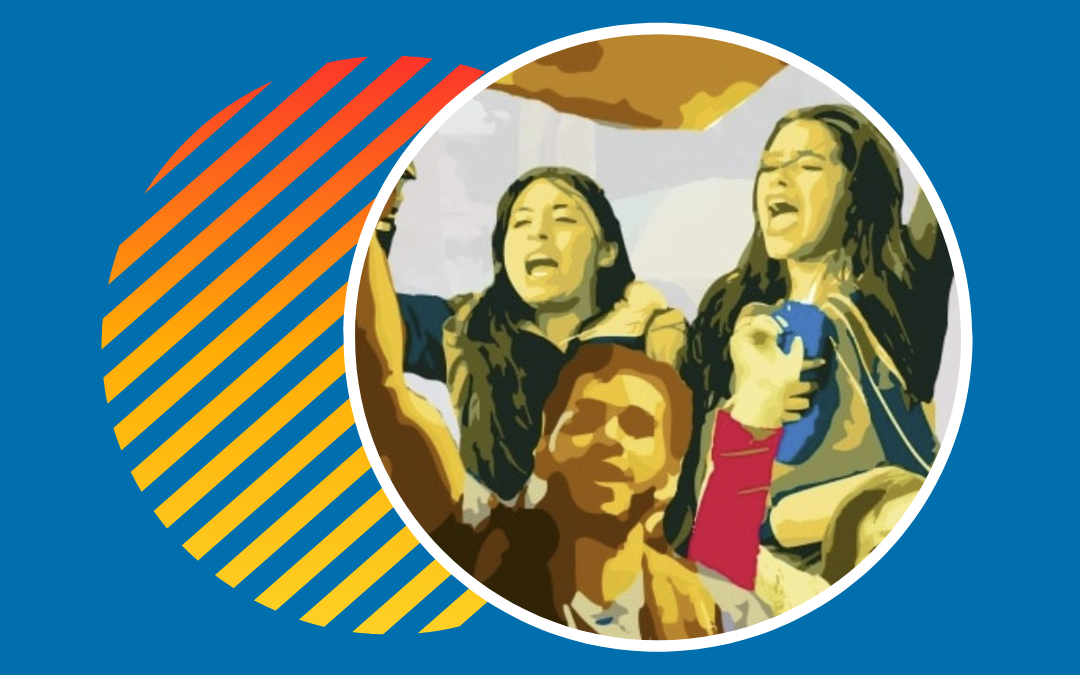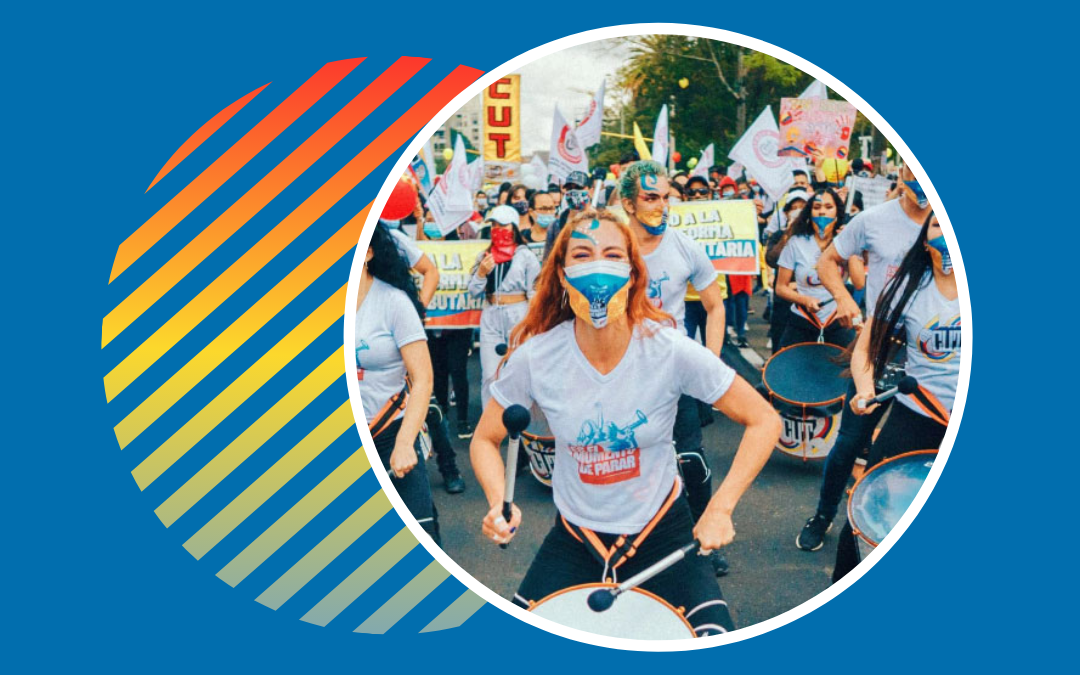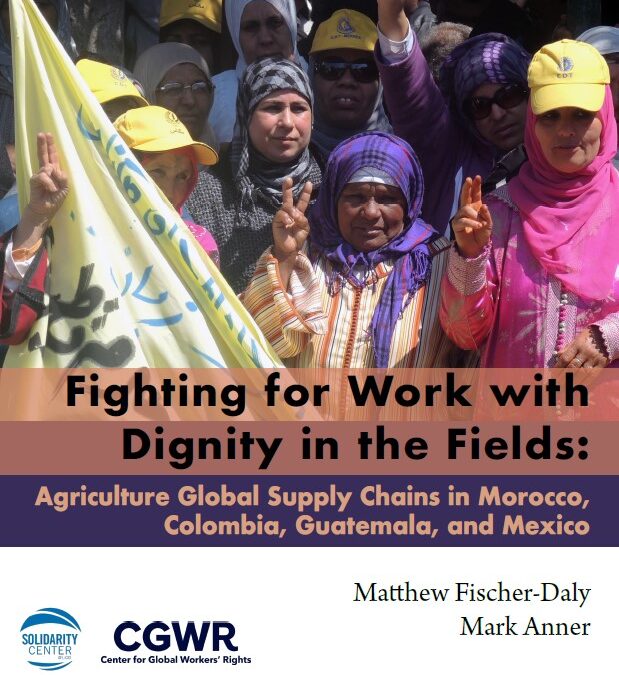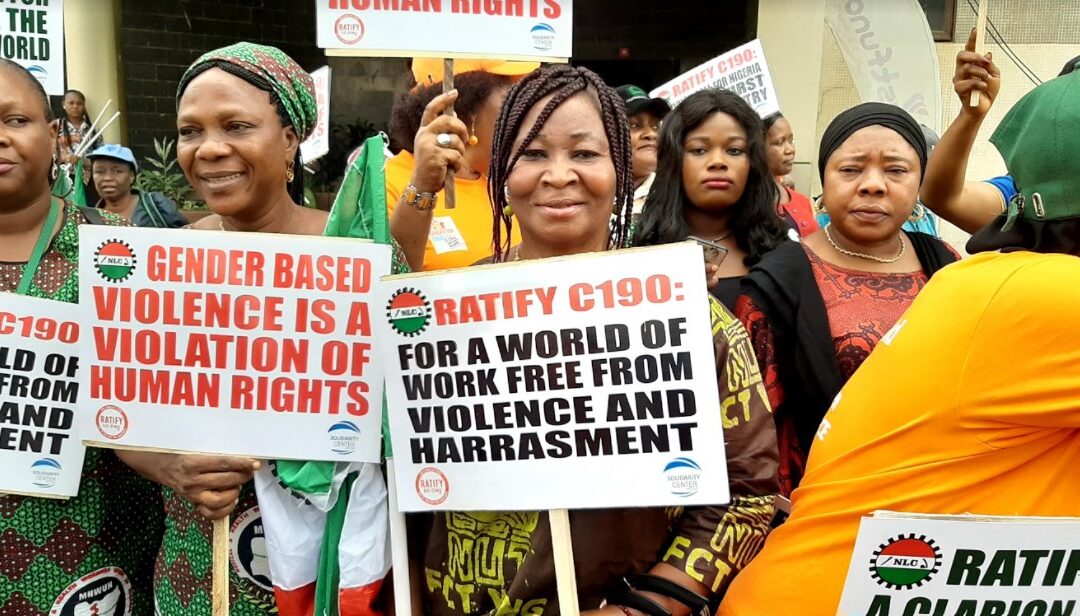
Joining Together, Building Power, Ending Gender Violence at Work
Sexual harassment and other forms of gender-based violence are rampant in garment factories in Bangladesh and throughout the textile production and retail industry in South Africa, according to two recently published Solidarity Center reports. The sample surveys are among a broad spectrum of outreach by Solidarity Center partners who also are addressing gender inequities through awareness efforts among informal economy workers and workers with disabilities in Nigeria, in labor rights and career workshops in Armenia and Georgia, and among app-based drivers in multiple countries.
In addressing the root causes of GBVH in the world of work, a priority for the Solidarity Center, workers and civil society join together to advocate collectively beyond the workplace to push for policy and legal reform, expanding democracy.
November 25 marks the start of 16 Days of Activism Against Gender-Based Violence, an annual international campaign in which union activists stand in solidarity with women’s rights activists to highlight the prevalence of GBVH at the workplace and to support feminist movements around the world in calling for a world free from GBVH. The campaign culminates on December 10, Human Rights Day.
As activists mobilize worldwide, here’s a snapshot of how Solidarity Center and its partners are moving forward efforts to end GBVH at the workplace and achieve decent, inclusive work for all.
Garment Industry: Rife with GBVH
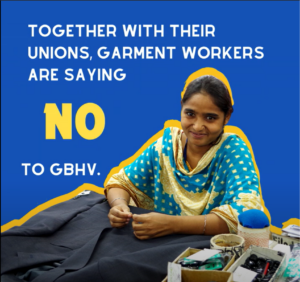 Because so little data exists on the prevalence of GBVH at workplaces, union activists and their allies in Bangladesh and South Africa sought to document workers’ experiences at garment factories and clothing outlets. Solidarity Center partners previously conducted similar studies in Cambodia, Indonesia and Nigeria.
Because so little data exists on the prevalence of GBVH at workplaces, union activists and their allies in Bangladesh and South Africa sought to document workers’ experiences at garment factories and clothing outlets. Solidarity Center partners previously conducted similar studies in Cambodia, Indonesia and Nigeria.
In South Africa, 98 percent of the 117 workers surveyed said they had experienced one or more forms of GBVH at work. The Bangladesh survey found severe outcomes for workers who experienced GBVH at work, with 89 percent saying they “broke down mentally” and 45 percent reporting leaving their jobs temporarily and/or losing pay. The survey involved 120 workers in 103 garment factories and was conducted by 21 activists from grassroots and worker organizations.
In many cases, workers’ jobs and wages were at risk if they did not agree to sex with employers or managers. In Bangladesh, 57 percent of survey participants said they lost their jobs because they refused such overtures. As one survey participant in South Africa said:
“My manager called me to his office and said that if I want to extend my hours of work, I must go out with him. He kept on asking, even forcefully and aggressively … I heard from other women workers that he had also asked them.” Survey participants were not identified for their safety.
Both surveys were conducted through participatory action research, rooted in collaboration, education, developing skills and centered on a “Do No Harm” ethos to avoid re-traumatizing interviewees. Through worker-driven strategies to address and prevent GBVH in the garment sector, the processes created a set of recommendations including urging employers to enforce zero tolerance policies for GBVH and for unions to prioritize GBVH prevention and make women worker safety a core union priority.
Key to the recommendations is ratification and enforcement of an international treaty on ending violence and harassment at work. Convention 190 was approved by the International Labor Organization (ILO) in 2019 after a decade-long campaign led in part by the Solidarity Center and its partners. C190 now must be ratified by governments, and union activists are mobilizing members and allies in ratification campaigns that include awareness-raising about GBVH at work. South African unions, led by the Congress of South African Trade Unions (COSATU), successfully pushed for ratification in 2021.
Reaching Marginalized Workers
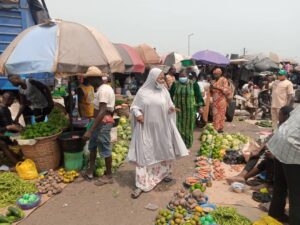
Amina Lawal, a Solidarity Center-trained GBVH researcher, leads the way for Nigerian Labor Congress leaders in Lagos’s Mile 12 market. Credit Solidarity Center / Nkechi Odinukwe
In Nigeria, union activists are using awareness raising to address the intersecting challenges facing workers with disabilities who also experience GBVH and gender discrimination at work. Through a weekly radio program and public service ads, the program elevates the voices of workers with disabilities who already are marginalized because of their status, providing a platform where they discuss their concerns around GBVH and access to equal rights to work and pay.
The program stems from recommendations in a survey of more than 600 workers with disabilities in Nigeria by the Trade Union Congress of Nigeria (TUC) to create mass awareness of disability rights and GBVH.
The radio program also is an avenue to reach workers in Nigeria’s large informal economy. Following the adoption of C190, union leaders at the Nigeria Labor Congress (NLC), with Solidarity Center support, began training vendors at the sprawling Mile 12 market in Lagos. The vendors formed a GBVH task force that worked with the NLC to develop a market code of conduct covering gender-based violence and harassment and helped raise awareness among vendors about their rights to a violence-free workplace.
Their outreach resulted in the identification of multiple cases of rape and sexual assault against minors, who often assist their parents in the market. Five people have been arrested and now are awaiting trial for allegedly violating the rights of children between 9 and 14 years old, said Agnes Funmi Sessi, NLC Lagos State Council chairperson.
Building Leadership Skills, Building Power

The OxYGen foundation in Armenia, with Solidarity Center support, held “Women for Labor Rights” seminars this year as part of its professional empowerment network. Credit: Solidarity Center
Building leadership and power within historically marginalized populations to take on issues and traditional hierarchies is a key part of Solidarity Center’s focus on ensuring equality and inclusion at the workplace.
In Armenia and Georgia, young women workers are learning crucial employment skills as part of Strengthening Women’s Participation in the Workforce, a Solidarity Center-supported program in partnership with professional networks and other civil society organizations. The project seeks to increase women’s full, equal and safe participation in the workforce, including vulnerable women workers’ access to decent work. Training sessions include exposure to science, technology, engineering and mathematics (STEM) professions and other career development, and cover labor rights, including the right to a safe and healthy workplace. The programs reach women in rural areas, many of whom are marginalized with limited access to job opportunities and skills building.
In Armenia, where the project operates as the Women Professional Empowerment Network (WPEN), young women take part in an interactive exchange that fosters the development of a supportive network and includes upskilling and raising awareness of employment opportunities, along with advice and guidance about the most in-demand new careers.
Women Delivery Drivers Stand Strong Together
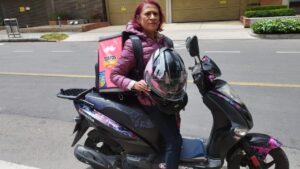
“Not just in Colombia, but worldwide, women are always the ones that are the most vulnerable and paid the worst”—Luz Myriam Fique Cárdenas. Credit: UNIDAPP_Jhonniel Colina
Addressing GBVH is an essential part of campaigns mobilizing app-based drivers to achieve their rights on the job, including the freedom to form unions, as the safety risks they face every day are especially compounded for women platform workers.
“Not just in Colombia, but worldwide, women are always the ones that are the most vulnerable and paid the worst,” Luz Myriam Fique Cárdenas told participants earlier this year at a Solidarity Center-sponsored event, Women Workers Organizing: Transforming the Gig Economy through Collective Action. “We suffer harassment. We don’t have security in the streets because we’re women,” said Cárdenas, president of Unión de Trabajadores de Plataformas (Union of Platform Workers, UNIDAPP) in Colombia.
Recently in Mexico, the Solidarity Center hosted women delivery drivers from seven countries in Latin America and in Nigeria. The eight unions participating agreed on five key gender-focused points for inclusion in the Convention on Decent Work on Digital Platforms now being drafted for consideration by the ILO. The women leaders at the Alza La Voz (Raise Our Voice) forum are planning a joint campaign to ensure the convention addresses the specific challenges women app-based workers face.
As throughout the campaigns to end GBVH at work, women app-based drivers are finding strength in joining together and experiencing the power to improve working conditions through collective action.
“We have to create alliances,” Shair Tovar, gender secretary of the National Union of Digital Workers (UNTA) in Mexico, told participants. “Women can achieve enormous things together.”

